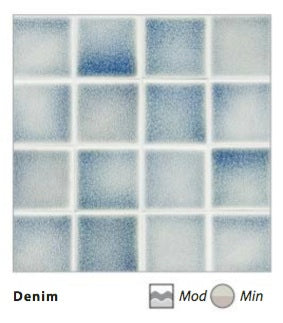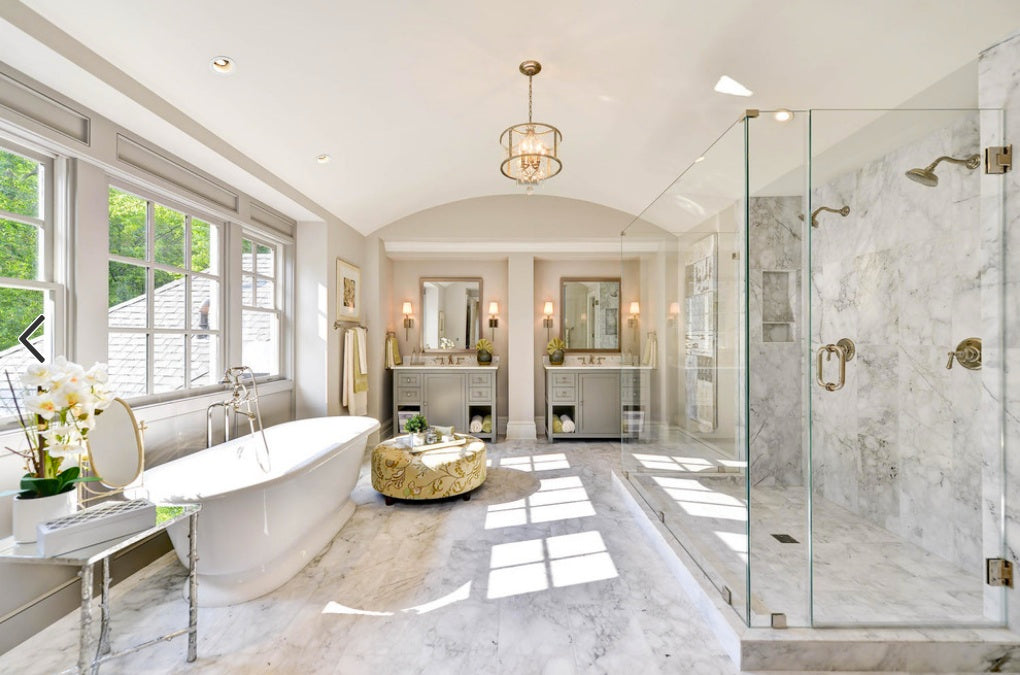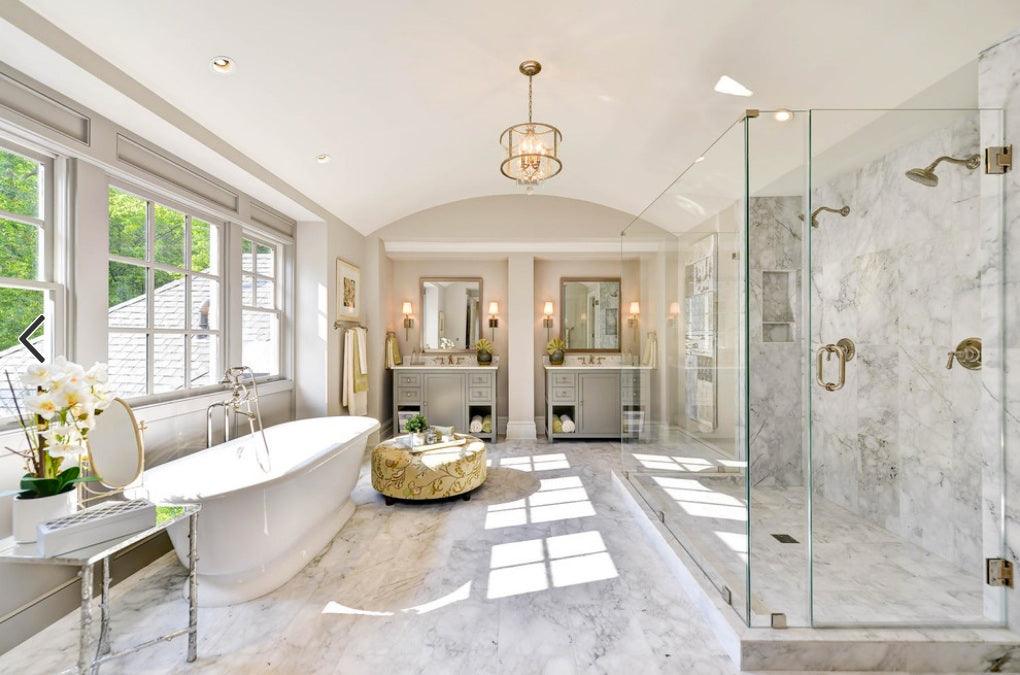Your Cart is Empty
Friday the 13th before Halloween -- If you're superstitious, you're avoiding bad luck by way of black cats, cracks in the sidewalk, and broken mirrors. On a day like today, you might expect the unexpected. The same could be said when considering a handmade ceramic or natural stone, because the variation in the tile's glaze or veining may surprise you. The good news is, when it comes to tile variation, there are ways to avoid the unexpected. This blog post is your lucky rabbit's foot. Architessa is here to help you know what type of range, be it subtle or extreme, to expect from ceramic, porcelain and stone; and to know how best to prepare for it. Now as for helping with black cats, we're dog people.
On a scale of one to ten, how much tile variation do you like? When creating clay-based ceramic or porcelain tiles, manufacturers strive for consistency or variety. In most cases, machine-made ceramics are the former and handmade ceramics are the latter. Porcelains too, can be made with a uniform look or to mimic veining found in natural stone. To help illustrate the amount of variation various ceramic and porcelain tiles have, a four-point scale is used:

According to the CTDA (Ceramic Tile Distributor Association) Rating System for shade variation among ceramic and porcelain tile, the V1 - V4 rating indicates the level at which a tile's color, tone and texture will vary from one piece to the next. Here are a few examples that Architessa offers:
Machine-made ceramics are a great example because they are known for their uniform shape and appearance. Tiles with a V1 rating have little to no change from one production run of tile to the next.

Our Basics Collection receives a V1 rating. It is a machine-made ceramic with a consistent white glaze. To learn more about this collection or ceramic tile in general, read our blog entry Expert Guide on Ceramic Tile.
Tiles with slight variation receive a V2 rating. Several porcelains fall into this category, because they are known for their controlled change in variation.
Here, this large format porcelain from our Vision Collection represents a V2 rating. The tile has a slight pattern variation from piece to piece, but the overall background is monochromatic and consistent. Check out our product page to see all four available color options from this readily available collection.
V3 tiles are those with moderate variation. Our Encore line, offers handmade ceramics made by tile artisans who more than understand variation.


Their catalog organizes their glazes by type and also provides an icon to illustrate how much each glaze will range in contrast (light to dark) and hue (color gradient). Here, the crackle glaze in Denim has a moderate range in contrast and a minimal range in hue. View Encore's full product catalog here, or visit their website at www.encoreceramics.com.
Tiles with this rating show a dramatic range in color and or texture. Porcelains made to look like natural stone are meant to mimic mother nature's high variation.

Architessa's Freedom Collection (discontinued) showcases a V4 rating, because it was designed to look like natural slate. The range in color from light beige to medium and dark grey is a dramatic affect that could work well with a range of neutral design schemes.
Thassos, for example, is a white marble that has little variation because instead of veining, it has a crystallized appearance. As a result, it's at the subtle end of the spectrum. Here, our Waverly mosaic features Thassos and Crema Marfil marbles. Notice that the white marble is clean and crisp throughout.

Slate, on the other hand can have extreme variation, landing it at the high end of the scale. Within each piece of tile, slate can range from black and grey to gold and green. Here, Rich Autumn slate does just that. Not only does the color shift, but the pattern changes as well. It's up to mother nature to decide how it looks, and you to decide if you like it. At Architessa, we like to source our natural stones from around the world. Whether it's marble from Italy, travertine from Turkey, or limestone from France, we're always looking for natural beauty to offer a range of options that make your tile project one-of-a-kind. Vice President of Sales, David Benson, also known as the @DCStoneGuy on Instagram, recently visited quarries and factories throughout northern Italy. With his nose to the grind stone, and feet to the cobble stoned pavers, he set out to find natural stone that would enhance AC's collections. While there, Benson was posed with the question, "where can we find the best Calacatta Gold?" Benson answered to the best of his ability: "Because God made all stone I don’t see how I as one individual can possibly describe something as 'the best'." "When we look at any natural stone," Benson replied, "it's tempting to say, 'I’m going to supply the best of the lots that are out there,' but from my experience in the industry, this notion of having the best is solely based on the eye of the customer."

"Because God made all stone, I don’t see how I as one individual can possibly describe something as 'the best'...it is all beautiful." -- David Benson, Vice President of Sales
The old adage, beauty is in the eye of the beholder, couldn't be more true when it comes to tile, especially variation in natural stone. Some clients crush over the cooler grey tones of Cararra marble, while others warm up to the warmer off-white and French grey of Calacatta Gold. "Every client strives to achieve that amazing look they have in their heads (or that they saw on Pinterest) to beautify their space," Benson continued, "so whether we are supplying something simple like a 12x12 Cararra marble with a solid grey background or a Calacatta Gold from the same mountain range, it is all beautiful."
 Sample, sample, sample! We can't stress enough how important it is to order a sample before placing an order. If considering a glazed ceramic, ask for a few pieces first. You may not like how the glaze pools or crackles. With natural stone, sample the current lot to be sure you like the color and veining.
Sample, sample, sample! We can't stress enough how important it is to order a sample before placing an order. If considering a glazed ceramic, ask for a few pieces first. You may not like how the glaze pools or crackles. With natural stone, sample the current lot to be sure you like the color and veining. Order overage. This helps your installer with tricky cuts, but also helps with variation. If there are pieces of tile you don't like, set them aside or use them under the vanity where they won't be seen.
Order overage. This helps your installer with tricky cuts, but also helps with variation. If there are pieces of tile you don't like, set them aside or use them under the vanity where they won't be seen. Inspect your material and do a dry layout. You or your installer should look through the ceramic or stone tiles as much as possible. Shuffle the tiles around, so you don't end up with all the lighter pieces on one side of the design, and the darker pieces on the other.
Inspect your material and do a dry layout. You or your installer should look through the ceramic or stone tiles as much as possible. Shuffle the tiles around, so you don't end up with all the lighter pieces on one side of the design, and the darker pieces on the other.Knowing that natural stone has natural variation, and taking various steps to prepare for that variation, can yield some pretty awesome results. "Stone from around the world is awesome and amazing," Benson says, "it just needs the right dreamer to take it home and install it in their shower or kitchen." Virginia-based firm Artisan Builders, along with Architessa, created a stunning master bathroom design with natural stone for their client.
 A master bath featuring Architessa's Silver Stitch, design by Artisan Builders, photo via Architessa on Houzz
A master bath featuring Architessa's Silver Stitch, design by Artisan Builders, photo via Architessa on HouzzFrom the use of a barrel vault on the ceiling, to the classic grey and white marble on the walls and floor, this space feels like an Italian villa from top to bottom. Our Silver Stitch marble was used for the overall monochromatic look. 
Taking a closer look at Silver Stitch, it's easy to see the variation in just one piece. Before placing an entire order, take a look at several pieces of marble to be sure you like what you see. This particular stone ranges from off-white and light grey to medium and dark grey. We're happy to offer a range of sample pieces from any of our stock collections, or to order pieces from our special order lines, to help you know what kind of variation to expect.

Another way to see a stone's natural variation, is through lot photos. Here, our warehouse has grouped several pieces of the Silver Stitch marble together to show the tile's variation. This lot photo also gives an idea of what it means to do a dry layout before installing your tile. We've done our best to shuffle the lighter and darker pieces to avoid an uneven distribution of veining.

Our staff loves to have fun, especially during Halloween. Whether it's our corporate offices or our showrooms, we enjoy decorating and dressing up. Stop by to see the latest tile trends, or to see how we look for Halloween. And if you can't stop thinking about a tile you've already seen, we'd love to help. Because nothing haunts you more than what you didn't buy.
For further questions about tile variation or the collections mentioned here; or to place a tile order, please contact sales@architessa.com. Want weekly updates about Architessa and our product lines? Join our newsletterhere.

